"Three Coins in the Fountain" is a popular song which received the Academy Award for Best Original Song in 1955. The song was first recorded by Frank Sinatra.

Little Nellie Kelly is a 1940 American musical-comedy film based on the stage musical of the same title by George M. Cohan which was a hit on Broadway in 1922 and 1923. The film was written by Jack McGowan and directed by Norman Taurog. Its cast included Judy Garland, George Murphy, Charles Winninger and Douglas McPhail.
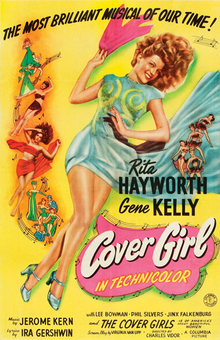
Cover Girl is a 1944 American musical romantic comedy film directed by Charles Vidor, and starring Rita Hayworth and Gene Kelly. The film tells the story of a chorus girl given a chance at stardom when she is offered an opportunity to be a highly paid cover girl. It was one of the most popular musicals of the war years.

It Happened in Brooklyn is a 1947 American musical romantic comedy film directed by Richard Whorf and starring Frank Sinatra, Kathryn Grayson, Peter Lawford and Jimmy Durante, and featuring Gloria Grahame and Marcy McGuire. It Happened in Brooklyn was Sinatra's third film for Metro-Goldwyn-Mayer, which had purchased his contract from RKO.

Rebecca of Sunnybrook Farm is a 1938 American musical comedy film directed by Allan Dwan, and written by Don Ettlinger, Karl Tunberg, Ben Markson and William M. Conselman, the third adaptation of Kate Douglas Wiggin's 1903 novel of the same name.
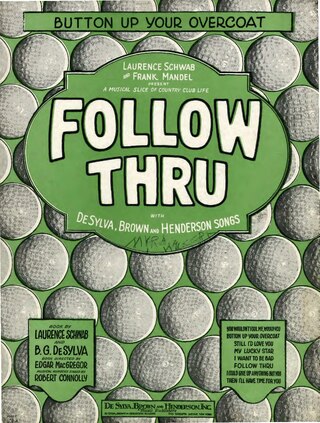
"Button Up Your Overcoat" is a popular song. The music was written by Ray Henderson, the lyrics by B.G. DeSylva and Lew Brown. The song was published in 1928, and was first performed later that same year by vocalist Ruth Etting. However, the most famous rendition of this song was recorded early the following year by singer Helen Kane, who was at the peak of her popularity at the time. Kane's childlike voice and Bronx dialect eventually became the inspiration for the voice of cartoon character Betty Boop.
"The Shadow of Your Smile", also known as "Love Theme from The Sandpiper", is a popular song. The music was written by Johnny Mandel with the lyrics written by Paul Francis Webster. The song was introduced in the 1965 film The Sandpiper, with a trumpet solo by Jack Sheldon and later became a minor hit for Tony Bennett. It won the Grammy Award for Song of the Year and the Academy Award for Best Original Song. In 2004, the song finished at number 77 in AFI's 100 Years...100 Songs poll of the top tunes in American cinema.
Constantin Bakaleinikoff was a Russian-American composer.
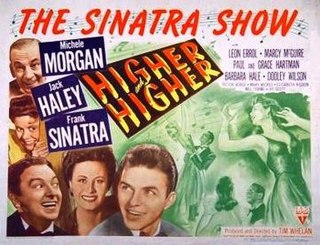
Higher and Higher is a 1944 musical film starring Michèle Morgan, Jack Haley, and Frank Sinatra, loosely based on a 1940 Broadway musical written by Gladys Hurlbut and Joshua Logan. The film version, written by Jay Dratler and Ralph Spence with additional dialogue by William Bowers and Howard Harris, diverges significantly from its source.

George White's Scandals is a 1945 American film starring Joan Davis, Jack Haley, Phillip Terry, and Glenn Tryon. It features Haley's Wizard of Oz co-star Margaret Hamilton. This film included music by Edwin Finckel.
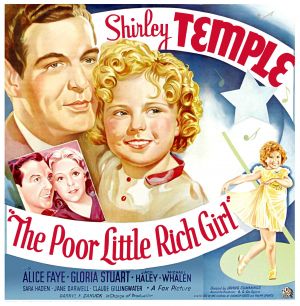
Poor Little Rich Girl, advertised as The Poor Little Rich Girl, is a 1936 American musical film directed by Irving Cummings and starring Shirley Temple, Alice Faye and Jack Haley. The screenplay by Sam Hellman, Gladys Lehman, and Harry Tugend was based on stories by Eleanor Gates and Ralph Spence, and the 1917 Mary Pickford vehicle of the same name. The film focuses on a child (Temple) neglected by her rich and busy father. She meets two vaudeville performers and becomes a radio singing star. The film received a lukewarm critical reception from The New York Times.
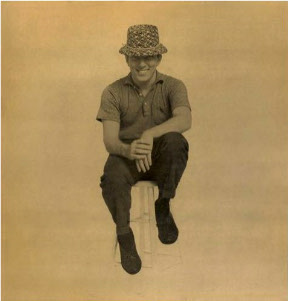
Andy Williams Sings Steve Allen is the first studio album by American pop singer Andy Williams that was released late in 1956 by Cadence Records. This was his first LP and features songs written or co-written by then-Tonight Show host Steve Allen. Williams, at the time, was a regular weekly contributor to Allen's groundbreaking late night television series. The review of the album in the December 22 issue of The Billboard that year reads, "Cover shows only a photo of the singer with no copy and it might have been a better bet to identify the personality." The cover of the 1960 reissue of the album attempts to rectify this situation with the title presented in two lines of large capital letters that sandwich a headshot of Williams this time instead of the seated pose of the original.
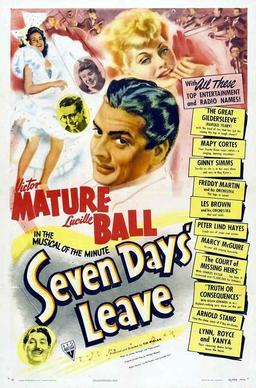
Seven Days' Leave is a 1942 musical comedy about a soldier who has seven days to marry an heiress in order to inherit $100,000.
Marilyn Jeanne McGuire was an American actress and contralto singer who was active in the 1940s.

Ding Dong Williams is a 1946 American comedy film directed by William Berke. The film stars Glen Vernon, Marcy McGuire, Felix Bressart, Anne Jeffreys, and James Warren. It was released on April 15, 1946 by RKO Radio Pictures.
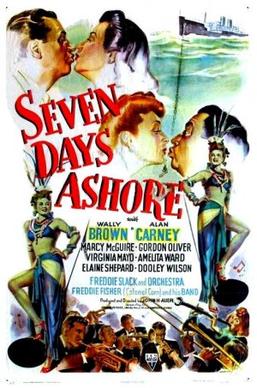
Seven Days Ashore is a 1944 American comedy film directed by John H. Auer and written by Edward Verdier, Irving Phillips and Lawrence Kimble. The film stars Wally Brown, Alan Carney, Marcy McGuire, Virginia Mayo, Elaine Shepard, Gordon Oliver, Amelita Ward and Dooley Wilson. The film was released on April 25, 1944, by RKO Pictures.

Around the World is a 1943 American musical comedy film produced and directed by Allan Dwan from an original screenplay by Ralph Spence. RKO Radio Pictures premiered the film at the Globe Theater in New York on November 24, 1943. The film has a large cast, and stars Kay Kyser and his band, Mischa Auer, Joan Davis, Marcy McGuire, Wally Brown, and Alan Carney. The picture follows Kyser and his troupe on a tour of U.S. military bases around the world. The film is full of one-liners, sight-gags, double-talk, running gags, and the kind of antic humor that made Kyser's band—actually a large, versatile orchestra—famous.

Paddy O'Day is a 1936 American comedy drama film directed by Lewis Seiler and released by 20th Century Fox. It stars Jane Withers, Pinky Tomlin, and Rita Hayworth. The story follows the adventures of a plucky Irish girl who arrives at Ellis Island only to discover that her mother, a cook in a wealthy Long Island home, has died. Hiding from the immigration officers who want to deport her, she charms everyone she meets, including the service staff and reclusive young master of the house. She goes to live with a family of Russian dancers that she met on the ship, and performs with them in their nightclub. Withers uses a heavy Irish brogue for her character and sings one song with an Irish accent and another song with a Russian accent. She also dances in several numbers, while Hayworth performs a traditional Russian dance in a nightclub revue.

Navy Blues is a 1941 American musical comedy film directed by Lloyd Bacon and written by Jerry Wald, Richard Macaulay, Arthur T. Horman and Sam Perrin. The film stars Ann Sheridan, Jack Oakie, Martha Raye, Jack Haley, Herbert Anderson, Jack Carson, Jackie Gleason and William T. Orr. The film was released by Warner Bros. on September 13, 1941.

Frank Redman was an American cinematographer from the end of the silent era through the 1960s. During his almost 40-year career, he shot over 60 feature films, as well as several film shorts and serials. In the 1950s, he transitioned to the smaller screen, where he was most well known for his work on the iconic television show, Perry Mason from the end of the 1950s through 1965.
















